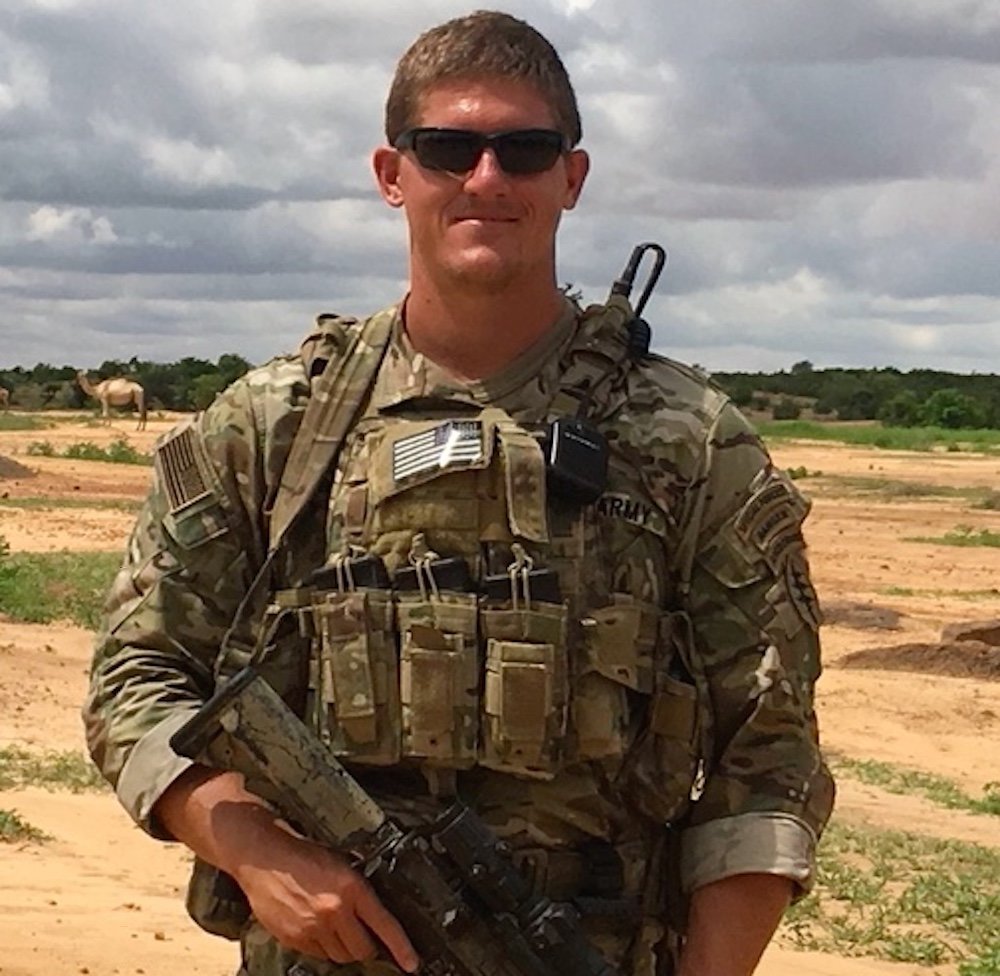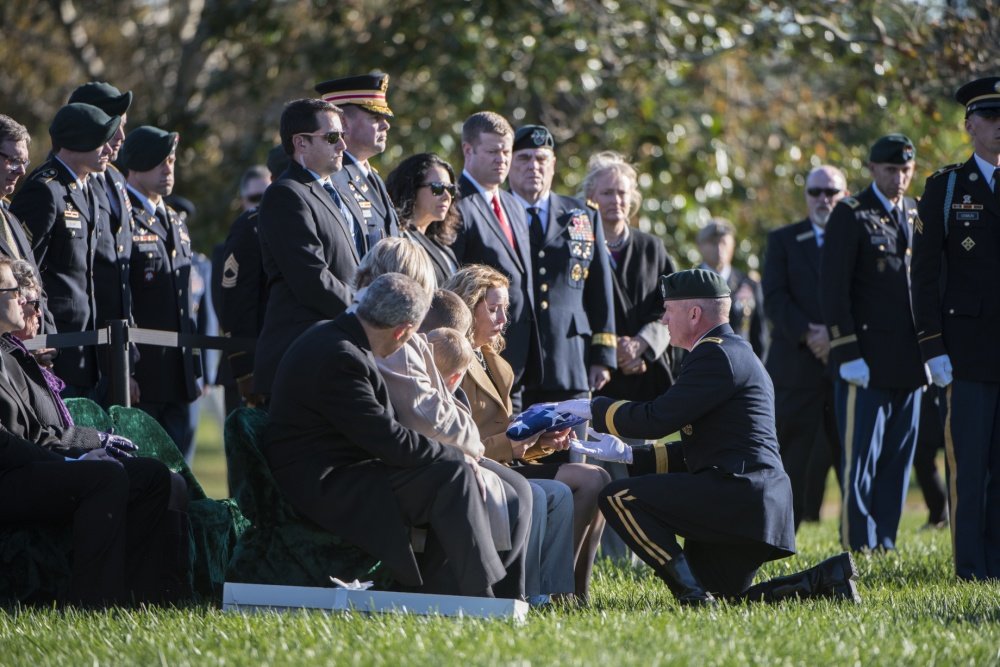Gold Star Widow Pens Her Fight for the Truth About Deadly 2017 Niger Ambush

Michelle Black and her husband, Staff Sgt. Bryan C. Black. Photo courtesy of Michelle Black.
For days, Michelle Black felt something gnawing in the pit of her stomach. When a family member called to ask if she had heard the news about an incident involving American forces in Niger, the mother of two already knew.
“I instantly was just, that was him. That was it. He was dead,” Black said, her voice cracking with emotion. “I had known for days something wasn’t right, and even before the deployment when I prayed, I wasn’t getting the same feeling that I normally get when I pray, that everything was going to be all right.”
Her Green Beret husband, Staff Sgt. Bryan C. Black, 35, of Puyallup, Washington, was one of four US soldiers — in addition to four Niger soldiers and an interpreter — killed in an ambush in the West African country Oct. 4, 2017. Black remembers her last call with him the night before when out of nowhere he told her he loved her and had to quickly rush off the phone, and the vows that the deployment was a safe one made up of primarily paper-pushing and routine patrols — and then the chilling knock at the door.
But in the fog of the days that passed — which morphed into weeks and months as the public scrutiny intensified and graphic conspiracies deluged the internet — a lack of official details marred Black’s endeavor to piece together the jigsaw puzzle of all that had transpired in her husband’s final moments. Many of those details were clouded by discrepancies.
“The first six months after there was so much going on and we were just trying to figure it all out. The media reports and what we were being told didn’t match up,” she said.

So Black took it upon herself to take up an investigation, chronicled in her recently released memoir, Sacrifice. First, there were questions of precisely what the mission was, why the US troops were moving in unarmored vehicles, when events turned deadly, how the chaos unfolded, and what kind of alleged cover-up emerged.
Operating close to the small town of Tongo Tongo — in Niger near the Malian border — the men were leaving a community meeting with several Nigerien associates. They carried only limited weaponry and were inside standard pickup trucks when a hail of bullets erupted from a band of rebels loyal to the regional ISIS affiliate. One of the men killed, Sgt. La David Johnson, was separated from the group and some of his remains were not recovered until weeks later.
It marked the most extensive loss of life amid conflict on the African continent since the searing 1993 “Black Hawk Down” fiasco in Somalia, in which 18 Americans died — 24 years, to the day, prior to the Niger ambush.
The US military had had a footprint in Niger since the early 2000s, mainly in the name of training local soldiers to combat terrorism in the post-9/11 landscape. However, the in-country presence had increased in the years leading up to the fatal ambush, in an effort to bolster resources should extremists maneuver into Niger from bordering Nigeria and Mali. Even now, threats posed by the Mali-based al Qaeda in the Islamic Maghreb, and Boko Haram from Nigeria, loom over the war-wracked region.
The Pentagon completed a 6,300-page probe in May 2018. Eight pages were declassified and made public, highlighting that “no single failure or deficiency was the sole reason for the events of Oct. 4, 2017.”
The investigation determined that the four Americans were “killed by small arms fire while actively engaging the enemy.”
But Black could not quell the nagging feeling that there was more she wasn’t being told.
“There was never actually a risk assessment. I couldn’t tell if it was just a poor investigation or if they (officials) were trying to mislead us,” she said.

According to Black, the Gold Star wives were also told in their official briefing a day earlier that several risk assessments had been done before sending the soldiers to the border, an account that her own investigation has found to be flawed.
“What we’re told happened inside the briefing compared to what I was told by (those) on the ground didn’t match up,” Black said. “I think a lot of people are going to be surprised by that. Once I talked to the men and heard their version, it just seemed a lot different from the (official) account.”
The Niger tragedy subsequently ignited a firestorm from both sides of the aisle in Washington about endless wars and where boundaries are drawn. For Black, questions swirled over why the danger level was not considered higher and why proper precautions had not been taken. And, perhaps just as importantly, she wanted to dispel the narrative that the men on the mission had been doing anything outside of what they were told to do.
“I was hearing all these things about this team was not indicative of what special operators on the continent were doing. But they were not this rogue team that made all the wrong moves,” Black said. “My husband was a very black-and-white person; he would not have gone against the leadership.”

More than a year after the Niger ambush, in November 2018, it was reported that the US military had reprimanded six troops — including a major general from the Air Force who commanded all special operations troops in Africa, and the Green Beret team leader — for their roles. The punishment letter cited insufficient training, an inadequate number of mission drills, and a lack of oversight from the top brass.
Beyond just deep-diving into the military mishap and her subsequent fight for answers, Black’s memoir traces her journey finding love as a college graduate on the ski slopes of Mammoth Lakes, becoming a military spouse and mom, her jolt into widow status, and the wincing aftermath of raising two sons, now 13 and 14, alone.
Sacrifice is also a window into the man Bryan Black was and a life rendered short in the line of duty. It was to be his last hurrah as an active-duty service member, as he was learning to code and had developed a stock market trading algorithm that was already in an early testing phase when he left for Africa.
“Bryan was such an incredible human being. He was kind to everyone. I always say he was better than I,” Black said. “He was an incredibly hard worker, taught himself multiple languages he knew would help him working in Africa, and was just the kind of person who never wasted a second of his life.”
Above all, she hopes that the reader walks away with a richer understanding of those who put their lives on the line — and the families who will continue to fight for the truth once the dust settles on tragedy.
“Plain and simple, the families of the fallen deserve to be respected. You cannot lie to them,” Black added. “I wanted the truth. Otherwise, they will just be scapegoated by higher authorities.”
Sacrifice: A Gold Star Widow’s Fight for the Truth by Michelle Black, G.P. Putnam’s Sons, 352 pages, $28, will be released May 4.
Read Next:

Hollie McKay is a foreign correspondent, war crimes investigator, and best-selling author. She was an investigative and international affairs/war journalist for Fox News Digital for over 14 years where she focused on warfare, terrorism, and crimes against humanity; in 2021 she founded international geopolitical risk and social responsibility firm McKay Global. Her columns have been featured in publications including the Wall Street Journal and The Spectator Magazine. Her latest book, Only Cry for the Living: Memos From Inside the ISIS Battlefield, is now available.
BRCC and Bad Moon Print Press team up for an exclusive, limited-edition T-shirt design!
BRCC partners with Team Room Design for an exclusive T-shirt release!
Thirty Seconds Out has partnered with BRCC for an exclusive shirt design invoking the God of Winter.
Lucas O'Hara of Grizzly Forge has teamed up with BRCC for a badass, exclusive Shirt Club T-shirt design featuring his most popular knife and tiomahawk.
Coffee or Die sits down with one of the graphic designers behind Black Rifle Coffee's signature look and vibe.
Biden will award the Medal of Honor to a Vietnam War Army helicopter pilot who risked his life to save a reconnaissance team from almost certain death.
Ever wonder how much Jack Mandaville would f*ck sh*t up if he went back in time? The American Revolution didn't even see him coming.
A nearly 200-year-old West Point time capsule that at first appeared to yield little more than dust contains hidden treasure, the US Military Academy said.












